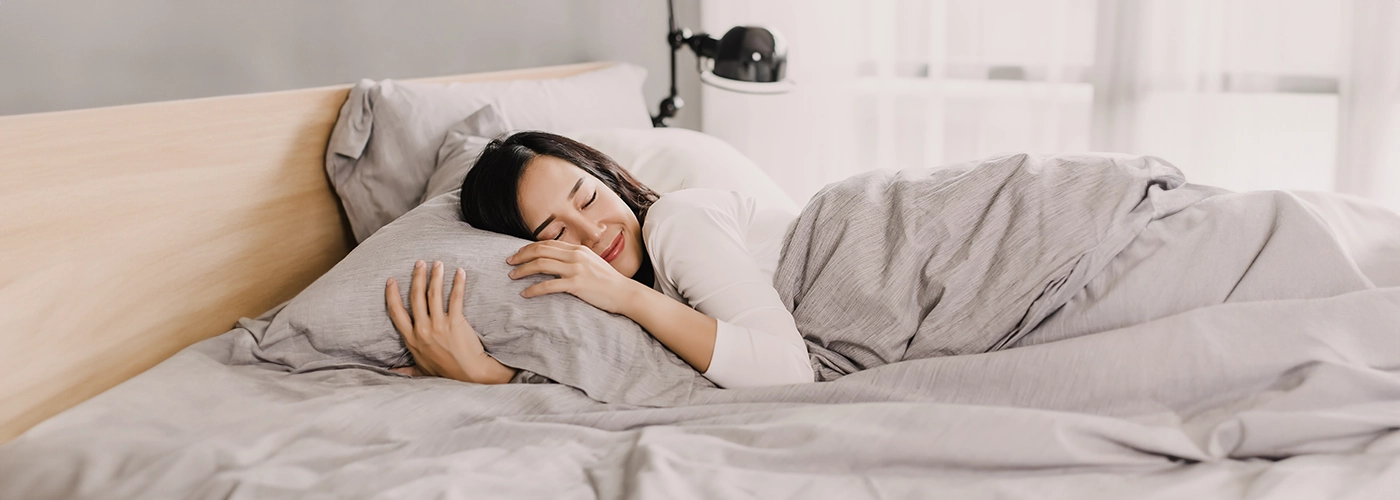Topics
Why Does Sleep Matter?
Sleep is essential for physical health, cognitive function, and emotional well-being. It is vital in maintaining overall health and supporting various bodily functions.
Insufficient sleep affects different aspects of our health and well-being:
- Cognitive impairment: Sleep is essential for cognitive functions such as memory, attention, and learning. Sleep deprivation can damage these functions, leading to reduced productivity and performance.
- Mood disorders: Sleep deprivation can cause mood disturbances, increased stress, anxiety, and depression as well.
- Physical health: Chronic sleep deprivation is linked to a higher risk of various health problems such as cardiovascular disease, diabetes, obesity, and a weakened immune system.
- Safety risks: Insufficient sleep can cause drowsiness and decreased alertness, heightening the possibility of getting into accidents.
What Are the 7 Tips to Get a Good Night’s Sleep?
Establish a Consistent Sleep Schedule
It is commonly known that a sleep routine helps babies and children fall asleep at a specific time. This applies to adults, too, as having a sleep routine lets your body programme itself to naturally fall asleep and wake up at specific times.
Practise consistent bedtime by heading to bed and waking up at the same time every day and on weekends as well.
Create a Relaxing Bedtime Routine
Falling asleep is easier if you are relaxed. Quiet reading, low impact stretching, listening to soothing music, and relaxation exercises are some calming activities that can be part of your bedtime routine to prepare your mind for sleep.
You should focus on trying to relax instead of attempting to fall asleep. Controlled breathing, mindful meditation, progressive muscle relaxation, and guided imagery are some relaxation methods that can help prepare you for a restful sleep.
Optimise Your Sleep Environment
Ensure your bed offers proper support, comfort, and enough space to minimise disturbances while you sleep. Make sure that your room is set to a proper, cool temperature. Minimalist, light colours and pleasant smells like lavender and geranium can also help create a calming sleep setting, shaping the ideal bedroom for you to relax in.
A darkened room also helps promote a comfortable sleep environment. If street lights or bright sunlight outside your window disturb your sleep, consider using heavier curtains, extra lining, or investing in blackout blinds to promote comfortable sleep.
Be Mindful of What You Eat and Drink
Your diet for sleep matters as specific types of food promote better sleep, and some do not. For example, avoid consuming caffeine, alcohol, and large meals during the hours before bedtime.
Consuming sugary food is bad because the rapid surge of energy, followed by a subsequent crash, can disrupt your body clock. Research has also proven that if you experience poor sleep, you are also more likely to consume junk food the following day, which leads to a cycle of inadequate sleep and an unhealthy diet.
Caffeinated drinks such as coffee, tea, and sodas are all trendy drinks. Some people are tempted to use caffeine to give them a spurt of energy to try to get over daytime sleepiness. However, caffeine and sleep are not a good combination. This method is unsustainable and can lead to long-term sleep deprivation.
One way to avoid sleeplessness is by watching your caffeine intake, particularly if consumed later in the day. For many individuals, taking coffee or other caffeinated beverages in the evening can affect their sleep. While alcohol might make you feel drowsy initially, it can disrupt sleep patterns later in the night.
A grumbling stomach can distract you from sleeping, but so can being overly full. Having big meals two to three hours before bedtime is not recommended, but going to bed hungry is also not helpful. If you are feeling peckish right before bed, foods that promote better sleep include having a small healthy snack to satisfy your hunger until breakfast.
Incorporate Regular Exercise
Engage in regular physical activity but try to complete your workout at least a few hours before bedtime. Exercise can promote better sleep, but working out too close to bedtime might have the opposite effect.
Manage Stress and Anxiety
You have so many bills to pay and so much to do every day. Your worries during the day affect you even at night. Stress, being a stimulus, activates the fight-or-flight hormones that hinder you from sleeping.
Therefore, stress management plays an important role in promoting better sleep. Make sure to give yourself some time to unwind before sleeping. Learning some relaxation techniques can promote good sleep and anxiety reduction during the day. For relaxation, try practicing deep breathing exercises. Inhale slowly and deeply, then exhale completely.
It is essential to take some time to relax before bed; taking a warm bath, reading a book, or listening to soothing music are some relaxing activities you can engage in before bedtime.
Some people write a list of activities to do before bed that may help take their minds off everything they need to complete tomorrow.
Limit Screen Time Before Bed
Reduce exposure to electronic devices (phones, tablets, computers) at least an hour before bedtime. The blue light emitted by screens can interfere with the production of the sleep hormone melatonin.
In conclusion, a good night’s sleep is the key to your overall health and mental state. Establish a consistent sleep schedule, create a relaxing bedtime routine, optimise your sleep environment, be careful of what you consume, exercise regularly, manage your screen time, or limit your screen time before bed.
You need to try what works out for you. Remember, the key is consistency. It may take time for your body to adjust to a new sleep routine, so be patient and stick to your habits.
Make an Appointment at Pantai Hospitals
If sleep problems such as insomnia or Obstructive Sleep Apnoea (OSA) persist, make an appointment with our ENT specialists.
Pantai Hospitals have been accredited by the Malaysian Society for Quality in Health (MSQH) for its commitment to patient safety and service quality.





.tmb-ph800x600.webp?Culture=en&sfvrsn=58cabd72_4)





